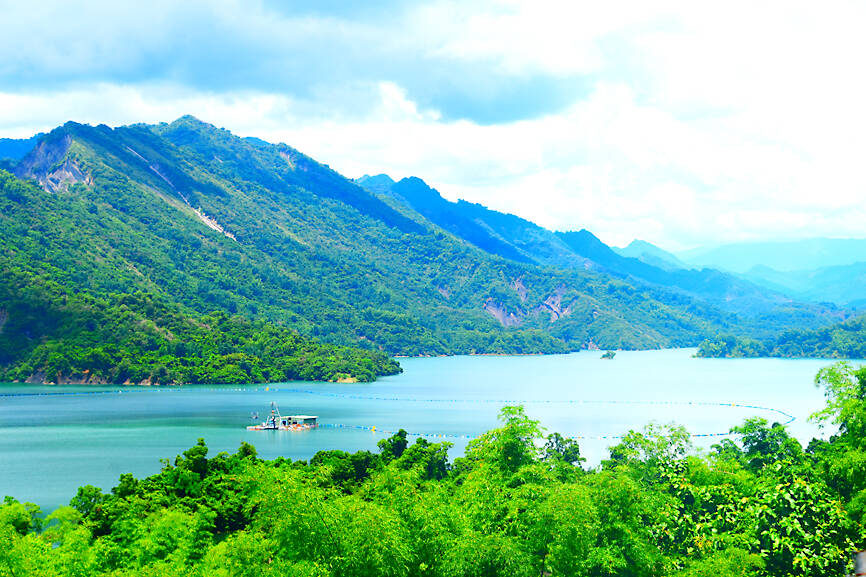Heavy rain from storms and weather fronts over the past month has significantly replenished reservoirs in southern Taiwan, but more is needed for irrigation after the current rainy season ends in November, the Water Resources Agency (WRA) said.
As of 4pm yesterday, the Zengwen Reservoir (曾文水庫), the biggest reservoir in the south, was filled to 67.43 percent of capacity with 341.77 million cubic meters of water.
That was about 260 million cubic meters more than the reservoir held at the same time last month, WRA figures showed.

Photo: Su Fu-nan, Taipei Times
The Wushantou Reservoir (烏山頭水庫) in Tainan, which is connected to the Zengwen Reservoir, was at 72.53 percent of capacity with 57.45 million cubic meters of water, giving the two reservoirs combined reserves of nearly 400 million cubic meters of water, the WRA said.
Meanwhile, as of 4pm yesterday, the Nanhua Reservoir (南化水庫), also in Tainan, had accumulated more than 88.95 million cubic meters of water and was at 99.4 percent of capacity.
Although the Nanhua Reservoir was nearly full, the water there is primarily used for households, while water for agricultural and industrial use is sourced primarily from the Zengwen and Wushantou reservoirs.
Many rice farmers were unable to irrigate their fields during the first two planting seasons in southern Taiwan this year because of the lack of water in the Zengwen and Wushantou reservoirs, and the WRA is hoping the situation will not be repeated next year.
The WRA’s Chianan Irrigation Association (嘉南水利會), which covers the agricultural hubs of Chiayi County and Tainan, said about 40 million to 50 million cubic meters of water is needed for the planting of fall crops and another 200 million cubic meters is needed for next year’s first rice planting season. If water needed for miscellaneous crops next spring is included, the association felt that more water is needed in the two reservoirs to ensure that farmers’ irrigation needs can be met.

Taiwan is stepping up plans to create self-sufficient supply chains for combat drones and increase foreign orders from the US to counter China’s numerical superiority, a defense official said on Saturday. Commenting on condition of anonymity, the official said the nation’s armed forces are in agreement with US Admiral Samuel Paparo’s assessment that Taiwan’s military must be prepared to turn the nation’s waters into a “hellscape” for the Chinese People’s Liberation Army (PLA). Paparo, the commander of the US Indo-Pacific Command, reiterated the concept during a Congressional hearing in Washington on Wednesday. He first coined the term in a security conference last

DEFENSE: The National Security Bureau promised to expand communication and intelligence cooperation with global partners and enhance its strategic analytical skills China has not only increased military exercises and “gray zone” tactics against Taiwan this year, but also continues to recruit military personnel for espionage, the National Security Bureau (NSB) said yesterday in a report to the Legislative Yuan. The bureau submitted the report ahead of NSB Director-General Tsai Ming-yen’s (蔡明彥) appearance before the Foreign and National Defense Committee today. Last year, the Chinese People’s Liberation Army (PLA) conducted “Joint Sword-2024A and B” military exercises targeting Taiwan and carried out 40 combat readiness patrols, the bureau said. In addition, Chinese military aircraft entered Taiwan’s airspace 3,070 times last year, up about

A magnitude 4.3 earthquake struck eastern Taiwan's Hualien County at 8:31am today, according to the Central Weather Administration (CWA). The epicenter of the temblor was located in Hualien County, about 70.3 kilometers south southwest of Hualien County Hall, at a depth of 23.2km, according to the administration. There were no immediate reports of damage resulting from the quake. The earthquake's intensity, which gauges the actual effect of a temblor, was highest in Taitung County, where it measured 3 on Taiwan's 7-tier intensity scale. The quake also measured an intensity of 2 in Hualien and Nantou counties, the CWA said.

The Overseas Community Affairs Council (OCAC) yesterday announced a fundraising campaign to support survivors of the magnitude 7.7 earthquake that struck Myanmar on March 28, with two prayer events scheduled in Taipei and Taichung later this week. “While initial rescue operations have concluded [in Myanmar], many survivors are now facing increasingly difficult living conditions,” OCAC Minister Hsu Chia-ching (徐佳青) told a news conference in Taipei. The fundraising campaign, which runs through May 31, is focused on supporting the reconstruction of damaged overseas compatriot schools, assisting students from Myanmar in Taiwan, and providing essential items, such as drinking water, food and medical supplies,